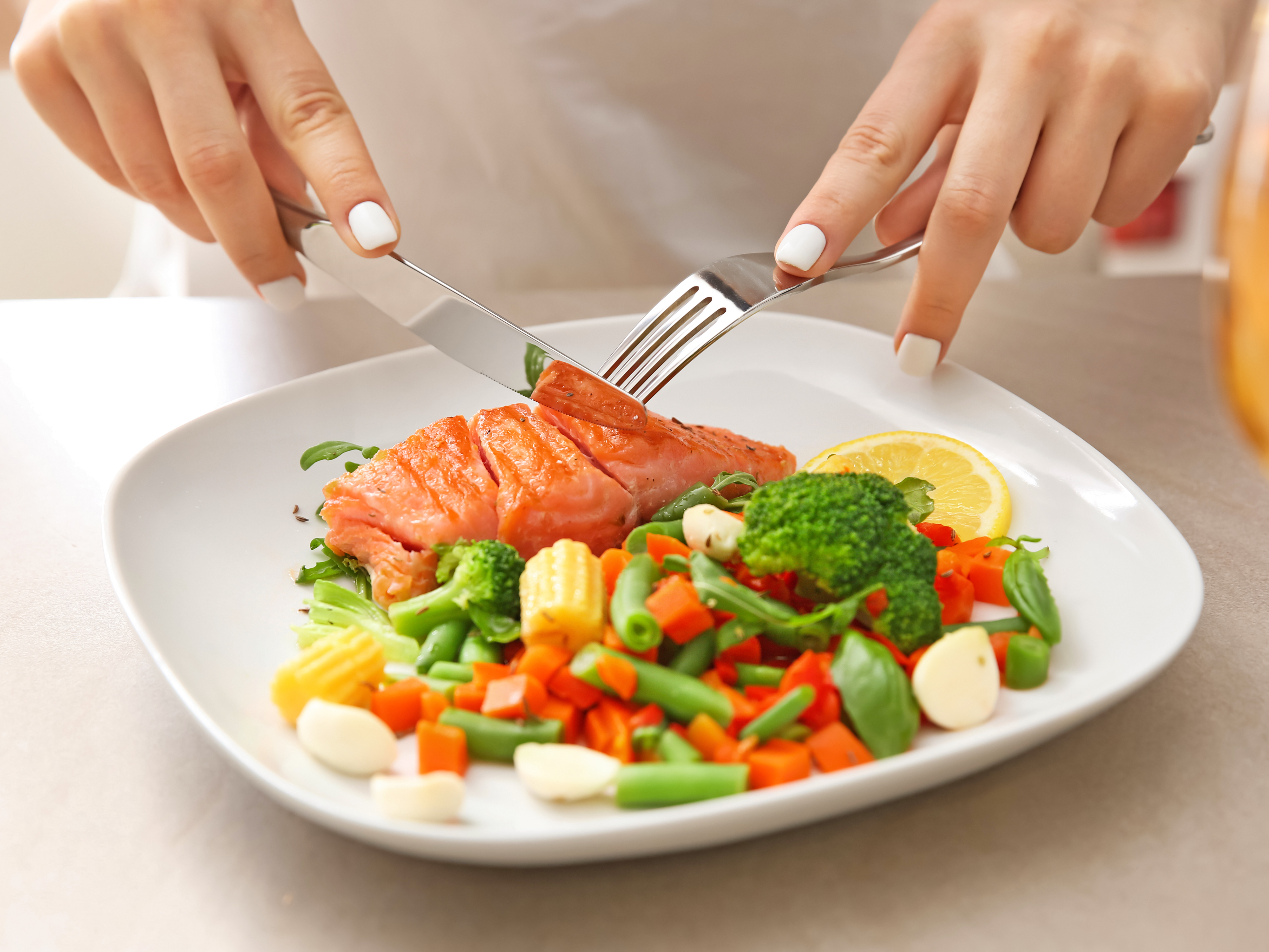- Endometriosis can cause inflammation, so an anti-inflammatory diet that is rich in whole foods and vegetables can help reduce painful symptoms.
- Some other foods that may help relieve symptoms are fruits, foods containing high amounts of omega-3s, fibrous products like oats and bran, and organic produce.
- Women with endometriosis should avoid red meat, trans fats, gluten, alcohol, and caffeine.
- This article was medically reviewed by Jamie Lipeles, DO, OB/GYN and founder of Marina OB/GYN in Marina Del Rey, CA.
- Visit Insider’s homepage for more stories.
Endometriosis is a condition where the uterine lining grows outside the uterus – causing painful, heavy periods and abdominal discomfort. More than 11% of women in the US, ages 15 to 44, are diagnosed with endometriosis.
Though more research is needed, studies have shown that a proper diet can lower the risk of developing endometriosis and also relieve symptoms. Here’s what you need to know about the link between diet and uterine health.
The connection between endometriosis and inflammation
Endometriosis happens when the tissue that makes up the uterine lining grows outside the uterus. Reproductive endocrinologist, Jessica Bauer, MD, says this can create an inflammatory environment that can irritate surrounding structures like the intestines, bladder, ovaries, and fallopian tubes, and thus cause pain.
During the progression of endometriosis, the immune system can become compromised, leading to an increase in the levels of estradiol and prostaglandin E2, which are hormones that promote inflammation. That’s why most experts suggest maintaining an anti-inflammatory diet to help prevent endometriosis and control the uncomfortable symptoms. An anti-inflammatory diet is largely plant-based and favors unprocessed foods like vegetables, fish, and nuts.
"By adhering to a diet that supports an anti-inflammatory environment, instead of a pro-inflammatory environment, the discomfort and pain of endometriosis may be lessened," says Bauer.
Foods that may help relieve symptoms of endometriosis
Minimizing the symptoms of endometriosis with dietary modifications does not require a special food plan. Dara Godfrey, MS, RD, a registered dietician at fertility clinic RMA of New York, says that young women who eat a diet that includes lots of fruits, vegetables, and healthy fats, and consume less red meats and unhealthy fats are less likely to have endometriosis. Here are some diet guidelines that are proven to help the condition.
Eat more fruits: Increasing your intake of fruits can have a positive impact on endometriosis symptoms, according to a 2018 study published in Human Reproduction. The reason, say researchers, has to do with the higher amounts of nutrients that promote the production of vitamin A. These nutrients are especially concentrated in citrus fruits.
Get enough fiber: One simple modification is adding fiber to your diet. According to one 2009 study published in the American Journal of Clinical Nutrition, this may help lower circulating estrogen concentrations by allowing your body to get rid of more estrogen through waste. Bran, oats, chia seeds, flax seeds, and fruits and vegetables are all excellent choices, says Godfrey.
Eat organic: Choose organic whenever possible, since women with endometriosis may be sensitive to the hormones in non-organic foods. However, researchers caution that the benefit of eating nonorganic fruits and vegetables far outweigh the risk - so try to eat organic, but if availability or price is a deterrent, it is okay to get whatever is available to you. Just remove the skin from nonorganic produce to reduce the risk of pesticide contamination
Add more omega-3: Include foods high in omega-3 fatty acids such as wild salmon, trout, sardines, anchovies, walnuts, chia seeds, freshly ground flax seeds, and fortified eggs. These are especially helpful for endometriosis because they actively reduce inflammation in the body. According to a 2015 study, "the more omega 3, the less inflammatory substances are synthesized."
In another 2010 study, researchers found that women who included omega-3 fatty acids were 22% less likely to be diagnosed with endometriosis. This is because omega-3 fatty acids are anti-inflammatory and may prevent the implantation of endometrial cells.
Choose high-iron foods: To help replace potential blood loss from increased bleeding from heavy periods, Godfrey says to eat iron-rich foods such as eggs, fish, green leafy vegetables, and black beans.
Foods to avoid if you have endometriosis
Although diet cannot cure endometriosis, Godfrey says that avoiding foods that create inflammation and raise estrogen levels in your body (both, which may contribute to endometriosis), may help improve symptoms.
Avoid red meat: Red meat, especially processed red meat, may lead to increased estrogen, which may also increase the risk of endometriosis. A 2018 study published in the American Journal of Obstetrics & Gynecology found that a higher intake of red meat increases the risk of endometriosis by 56%. Also, red meat contains high amounts of hormones and is a pro-inflammatory food, which could lead to a surge of uncomfortable symptoms for those who have already been diagnosed with endometriosis.
Skip products that boost estrogen: Alcohol and caffeine boost estrogen levels and should be avoided.
Limit saturated and trans fats: And of course, it's important to limit the amount of saturated fat and trans fat in your diet. Although reducing trans fat is a healthy choice for most people, one 2010 observational study published in Human Reproduction found that while total fat consumption was not associated with endometriosis risk, trans fat was linked to an increased risk. In fact, the women who ate the most trans fat in foods such as fried foods and baked goods increased their risk of endometriosis by 48%.
Avoid gluten: A 2012 study published in Minerva Chirurgica evaluated whether or not a gluten-free diet could reduce the painful symptoms associated with endometriosis. Of the 207 participants, 156 of them reported a significant decrease in painful symptoms at a 12-month follow-up, which led the researchers to conclude that following a gluten-free diet can lead to a reduction in painful symptoms of endometriosis.
These foods may be hard to avoid entirely, but making the switch to meals that are primarily anti-inflammatory, high in omega-3, and contain a multitude of vegetables could benefit women with endometriosis.
Related stories about women's health:
- Birth control pills can help treat acne, but some types are better than others
- You can get pregnant with an IUD but it's extremely rare
- What to expect after IUD removal: From prep to recovery
- How late in pregnancy can you fly: The latest and best times to fly
- Does birth control make you gain weight? Research is clear it does not
- How long it takes for condoms, birth control pills, and other types of birth control to expire
- What is a molar pregnancy and how to treat it










